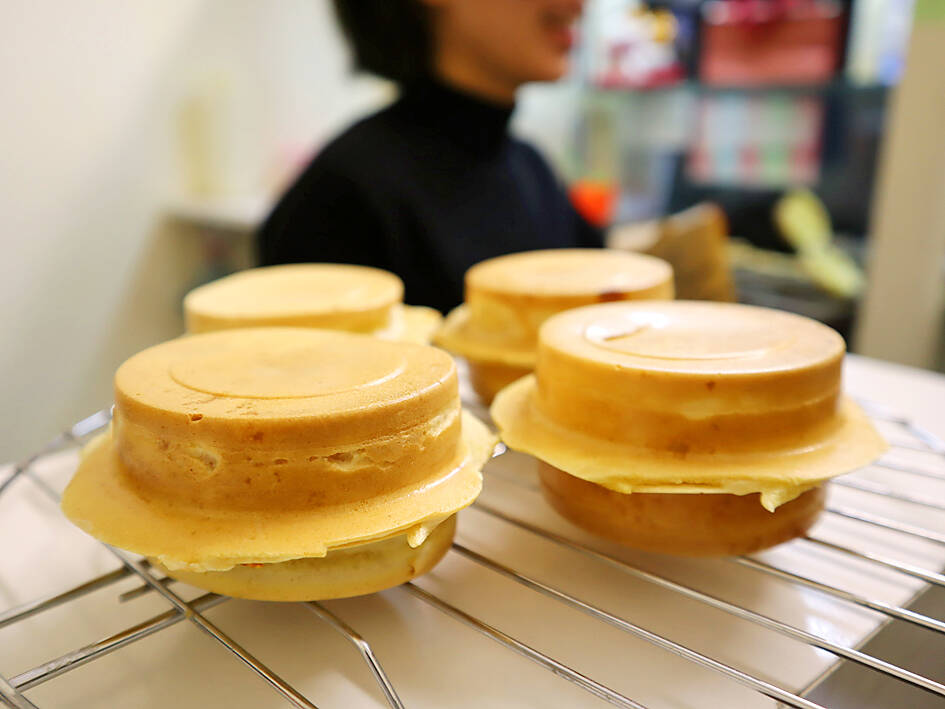A Vietnamese entrepreneur who fell in love with Taiwanese wheel cakes while studying in Taiwan is selling the delicacies, rebranded as “Taiwanese UFO pancake.”
Tran Thi Thu Hang said her favorite snacks while studying in Taiwan were sweet potato balls and wheel cakes, which are inspired by the Japanese imagawayaki pastry.
Like its Japanese counterpart, wheel cake is a cylindrical confection with a texture similar to pancakes. Wheel cakes are offered with several fillings, with savory ones usually eaten as a snack between meals and sweet wheel cakes eaten as a dessert.

Photo: CNA
Studying at Feng Chia University in Taichung from 2015 to 2019, Tran often frequented the nearby Fengjia Night Market (逢甲夜市) to feast on her favorite snacks, especially wheel cakes.
“It’s hot, it’s spongy, it’s crispy and crumbly all in one,” Tran said. “Taking a bite with a mouthful of filling was a sensation I had never experienced before in Vietnam.”
Although she first worked at a private company after her return to Vietnam, Tran said she was unable to shake off a dream she had since her youth: to run her own business.
Eventually, Tran decided to focus on wheel cakes, as the pastry’s versatility gave her the flexibility needed to create enough flavors to cater to Vietnamese tastes.
Ten months after she started her company, Tran serves up to 15 flavors, including staples such as red bean, macha and custard, which she also enjoyed in Taiwan, but also spicy chicken, a taste she designed for Vietnamese customers.
Asked why she rebranded the Taiwanese pastry, Tran asked: “Don’t you think that wheel cakes look like UFOs?” referring to unidentified flying objects.
Customers flood her store out of either curiosity or love for the flavor, she said.
“After eating Taiwan UFO pancakes, my troubles seemed to be teleported to another universe,” one review of her products reads.
Tran said she runs the business on her own, so she only has time to ensure quality control, but none for promoting it.
Tran said she developed her customer-first work ethic during her years in Taiwan.
Meanwhile, her fans made up for her lack of advertising by taking it upon themselves to spread word about her food on social media, Tran said.
Gratitude for her time in Taiwan is the source of her business idea, she said, adding that she attends events held by the Taipei Economic and Cultural Office in Vietnam and Taiwanese business organizations.
At such events, she sells her products, she said, adding that it helps her promote Taiwanese food in Vietnam.
“Vietnamese people only know that Taiwan has milk tea and pineapple cakes,” Tran said. “I want to make wheel cake big here and help people get to know Taiwan better.”

Alain Robert, known as the "French Spider-Man," praised Alex Honnold as exceptionally well-prepared after the US climber completed a free solo ascent of Taipei 101 yesterday. Robert said Honnold's ascent of the 508m-tall skyscraper in just more than one-and-a-half hours without using safety ropes or equipment was a remarkable achievement. "This is my life," he said in an interview conducted in French, adding that he liked the feeling of being "on the edge of danger." The 63-year-old Frenchman climbed Taipei 101 using ropes in December 2004, taking about four hours to reach the top. On a one-to-10 scale of difficulty, Robert said Taipei 101

A preclearance service to facilitate entry for people traveling to select airports in Japan would be available from Thursday next week to Feb. 25 at Taiwan Taoyuan International Airport, Taoyuan International Airport Corp (TIAC) said on Tuesday. The service was first made available to Taiwanese travelers throughout the winter vacation of 2024 and during the Lunar New Year holiday. In addition to flights to the Japanese cities of Hakodate, Asahikawa, Akita, Sendai, Niigata, Okayama, Takamatsu, Kumamoto and Kagoshima, the service would be available to travelers to Kobe and Oita. The service can be accessed by passengers of 15 flight routes operated by

Taiwanese and US defense groups are collaborating to introduce deployable, semi-autonomous manufacturing systems for drones and components in a boost to the nation’s supply chain resilience. Taiwan’s G-Tech Optroelectronics Corp subsidiary GTOC and the US’ Aerkomm Inc on Friday announced an agreement with fellow US-based Firestorm Lab to adopt the latter’s xCell, a technology featuring 3D printers fitted in 6.1m container units. The systems enable aerial platforms and parts to be produced in high volumes from dispersed nodes capable of rapid redeployment, to minimize the risk of enemy strikes and to meet field requirements, they said. Firestorm chief technology officer Ian Muceus said

MORE FALL: An investigation into one of Xi’s key cronies, part of a broader ‘anti-corruption’ drive, indicates that he might have a deep distrust in the military, an expert said China’s latest military purge underscores systemic risks in its shift from collective leadership to sole rule under Chinese President Xi Jinping (習近平), and could disrupt its chain of command and military capabilities, a national security official said yesterday. If decisionmaking within the Chinese Communist Party has become “irrational” under one-man rule, the Taiwan Strait and the regional situation must be approached with extreme caution, given unforeseen risks, they added. The anonymous official made the remarks as China’s Central Military Commission Vice Chairman Zhang Youxia (張又俠) and Joint Staff Department Chief of Staff Liu Zhenli (劉振立) were reportedly being investigated for suspected “serious